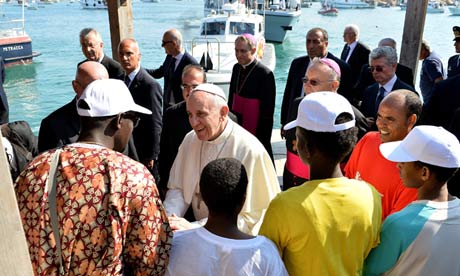-

-
“Migration is still an aspiration to hope, notwithstanding new developments and the emergence of situations which are at times painful and even tragic”, said the Pope in his address to the participants in the Seventh World Congress for the Pastoral Care of Migrants, affirming the powerful hope that inspires many inhabitants of troubled areas throughout the world to seek a better future for their families in other places, even at the risk of disappointment and failure. This, he remarked, is caused in great part by the economic crisis which, to differing degrees, affects every country.The three-day Congress highlighted the dynamics of cooperation and development in the pastoral care of migrants. “First and foremost you have analysed the factors which cause migration, in particular: inequality, poverty, overpopulation, the growing need for employment in some sectors of the global job market, disasters caused by climate change, wars and persecution, and the desire of younger people to relocate as they seek new opportunities. Moreover, the link between cooperation and development shows, on the one hand, the difference of interests between states and migrants, and, on the other hand, the opportunities which derive for both”.“In effect, receiving nations draw advantages from employing immigrants for production needs and national prosperity, not infrequently filling gaps created by the demographic crisis”, observed the Holy Father. “In turn, the nations which migrants leave show a certain reduction in unemployment and, above all, benefit from earnings which are then sent back to meet the needs of families which remain in the country. Emigrants, in the end, are able to fulfil the desire for a better future for themselves and their families. Yet we know that some problems also accompany these benefits. We find in the countries of origin, among other things, an impoverishment due to the so-called ‘brain drain’, the effects on infants and young people who grow up without one or both parents, and the risk of marriages failing due to prolonged absences. In the receiving nations, we also see difficulties associated with migrants settling in urban neighbourhoods which are already problematic, as well as their difficulties in integrating and learning to respect the social and cultural conventions which they find. In this regard, pastoral workers play an important role through initiating dialogue, welcoming and assisting with legal issues, mediating with the local population. In the countries of origin, on the other hand, the closeness of pastoral workers to the families and children of migrant parents can lessen the negative repercussions of the parents’ absence”.However, the Congress affirmed that the implications of the Church’s pastoral concern in the overall context of cooperation, development and migration go much further, and “it is here that the Church has much to say. The Christian community, in fact, is continuously engaged in welcoming migrants and sharing with them God’s gifts, in particular the gift of faith”. Furthermore, the Church “promotes pastoral plans for the evangelisation and support of migrants throughout their journey from their country of origin, through countries of transit, to the receiving countries. She gives particular attention to meeting the spiritual needs of migrants through catechesis, liturgy and the celebration of the Sacraments”.“Sadly”, he added, “migrants often experience disappointment, distress, loneliness and marginalisation. In effect, the migrant worker has to deal with the problem both of being uprooted and needing to integrate. Here the Church also seeks to be a source of hope: she develops programs of education and orientation; she raises her voice in defence of migrants’ rights; she offers assistance, including material assistance to everyone, without exception, so that all may be treated as children of God. When encountering migrants, it is important to adopt an integrated perspective, capable of valuing their potential rather than seeing them only as a problem to be confronted and resolved. The authentic right to development regards every person and all people, viewed integrally. This demands that all people be guaranteed a minimal level of participation in the life of the human community. How much more necessary must this be in the case of the Christian community, where no one is a stranger and, therefore, everyone is worthy of being welcomed and supported”.
“The Church, beyond being a community of the faithful that sees the face of Jesus Christ in its neighbour, is a Mother without limits and without frontiers. She is the Mother of all and so she strives to foster the culture of welcome and solidarity, where no one is considered useless, out of place or disposable. … Migrants, therefore, by virtue of their very humanity, even prior to their cultural values, widen the sense of human fraternity. At the same time, their presence is a reminder of the need to eradicate inequality, injustice and abuses. In that way, migrants will be able to become partners in constructing a richer identity for the communities which provide them hospitality, as well as the people who welcome them, prompting the development of a society which is inclusive, creative and respectful of the dignity of all”.
The Pope concluded by invoking upon the participants in the Congress “the protection of Mary, Mother of God, and St. Joseph, who themselves experienced the difficulty of exile in Egypt”.Source: Vatican Radio





